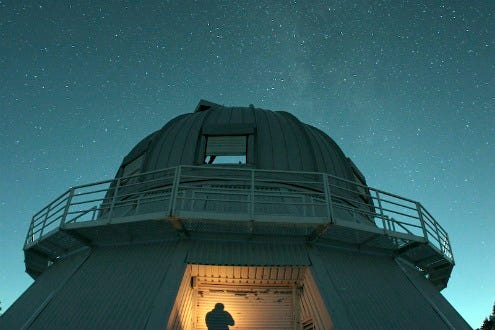The City Dark

For info and showtimes, click here.
Ian Cheney's documentary is on the illuminating topic of illumination. Acting as director and the audience's personal guide, he explores the issue of light pollution — the notion that all this man-made light spilling out into the night sky is ruining our view of the stars.
This might seem like a quibbling matter, but Cheney shows how tuned in humans are to the patterns of the dark and how all the lights have a negative impact on innumerable animal species, too.
The film tends to drag a bit in certain sections, particularly when Cheney strains for some poetic observations: "What do we lose when we lose the night?"
But there are also plenty of interesting parts where Cheney goes out into the world and explores different aspects of light and dark that may not have even occurred to us.
For instance, one of the many duties of the scientists who watch the skies professionally is to keep an eye out for "killer asteroids" — the massive bodies hurtling through space which could impact the earth with enough force to wipe out most living things as previously happened with the dinosaurs. All the light pollution makes their highly sensitive telescopes much less effective.
Also, all those birds who continually run into high-rise buildings, killing or injuring themselves, are not stupid critters trying to fly through glass. Birds navigate at night using the stars, and the man-made constellations of the modern city confuse them and send them careening off course.
Tens of thousands of baby sea turtles are lost every year because they emerge from their shells on the beaches of Florida or other coasts and head for the twinkling unnatural lights of shore instead of the reflection of the stars in the ocean.
I also enjoyed Cheney's visit to Sky Village, Ariz., a community in the middle of nowhere that seems to consist entirely of amateur stargazers who relish the almost complete lack of man-made light. It's funny to see all these little adobe houses with massive observatory domes built upon them.
I also found fascinating — though also highly suspect — a section in which medical researches offer still-slender evidence that human beings are literally killing themselves by staying up all night. The lack of melatonin the body produces in darkness helps keep cancerous tumors at bay.
Cheney also spends too little time looking at the counterarguments of why lighting up the globe is beneficial. He spends just a few minutes talking about decreased crime rates, but that's about it.
"The City Dark" has a novel subject, but it sometimes registers more as an educational film than entertaining enlightenment.
3 Yaps



